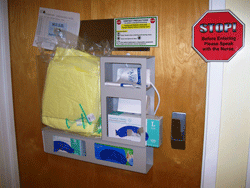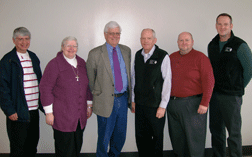Penobscot Valley Hospital promotes an open patient visitation policy and recognizes the importance of family and visitors to support the wellness of our patients. There are unique circumstances where visitation may be adjusted. Nursing leaders will review these exceptions and make adjustments to visitation according to our policy. Visitation should continue to be prioritized for those visitors important for the patient’s physical or emotional well-being and care.
Inpatient Unit: Visitation will be allowed for two adult visitors per patient.
ED: One adult visitor per patient at a time will be allowed. Two visitors will be allowed if patient is a minor. There may be times that additional limitations need to be made and will be communicated to the patient/visitor as not all rooms are private rooms and additional patient safety evaluation will be made.
Surgical Services: One visitor/support person will be allowed per patient to be present during the intake process. After the intake process, the visitor will be asked to wait in the waiting area during the procedure then will brought back in to be present during the discharge process.
The following are general guidelines for visitors:
 Sometimes, patients in the hospital are being treated for infections or communicable diseases that will require all who enter the room to take extra steps to prevent the spread of the illness. In these instances, hospital staff and visitors are asked to honor specific “isolation precautions.” Isolation precautions are the methods that all hospitals implement to keep germs from spreading. When a patient is undergoing treatment for infection, a STOP sign will be placed on the patient’s door. The STOP sign is designed to politely remind visitors that they need to speak with a nurse prior to entering the room.
Sometimes, patients in the hospital are being treated for infections or communicable diseases that will require all who enter the room to take extra steps to prevent the spread of the illness. In these instances, hospital staff and visitors are asked to honor specific “isolation precautions.” Isolation precautions are the methods that all hospitals implement to keep germs from spreading. When a patient is undergoing treatment for infection, a STOP sign will be placed on the patient’s door. The STOP sign is designed to politely remind visitors that they need to speak with a nurse prior to entering the room.
Following these safety precautions is essential to protect yourself, your family, the patients and hospital staff. The hospital provides protective coverings free of charge in a compartment on the outside of the patient’s door. These coverings include gowns, gloves, and masks if needed. Please ask the nurse for assistance before entering the room.
The Hospitalists are physicians who specialize in caring for patients during their stay in the hospital. They are the physicians who organize the patient’s care between departments and serve as the point of contact for other doctors and nurses, including the patient’s primary care physician (PCP). Since the Hospitalists now cover the service 24/7 in-house, they are able to meet with families after regular business hours. This is much more convenient for many working families who may have missed rounding during the day. If you have a loved one in the hospital, simply ask your nurse any time you would like to meet with the Hospitalist.

Hospital chaplains are available around the clock at PVH to provide spiritual support for patients, family members, and hospital staff. Chaplains work closely with the patient care staff at PVH and are an integral part of our healthcare team. The spiritual services they provide are interfaith.
If you have specific medical wishes, please print and complete this Advance Directive. Be sure to distribute copies to our hospital, your physicians, and family. An Advance Directive is an essential part of your medical care, especially when you are unable to speak your wishes in a medical emergency. Everybody should have an Advance Directive on file.